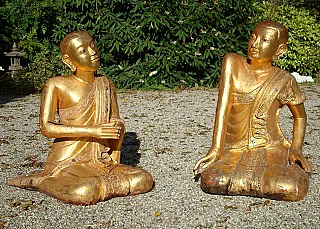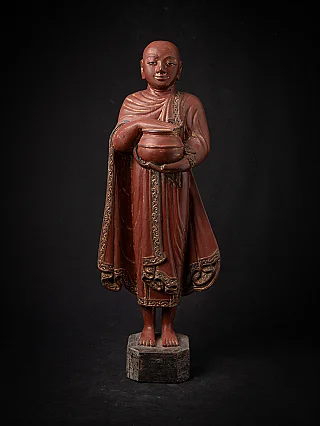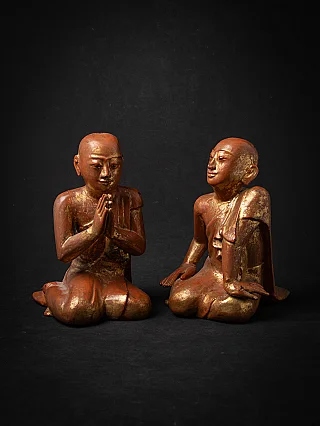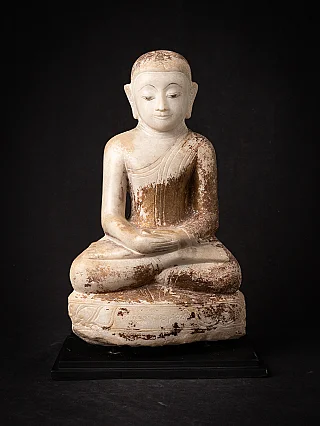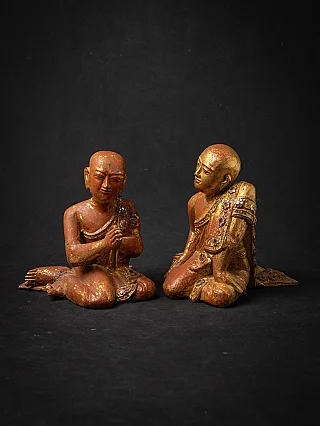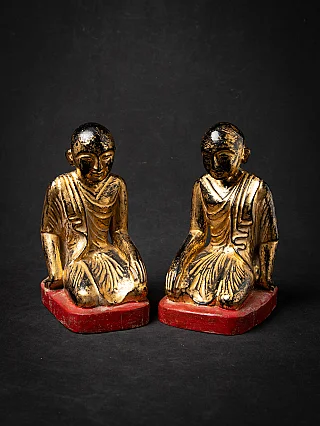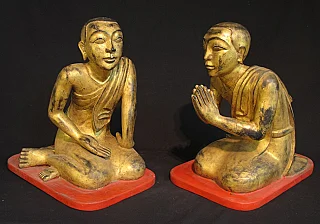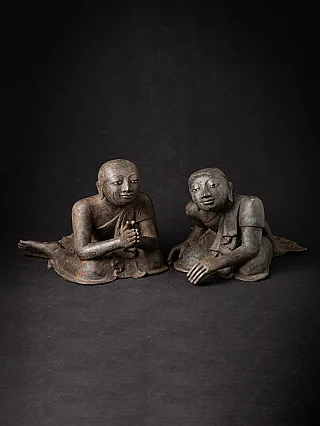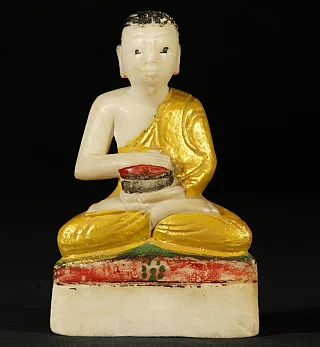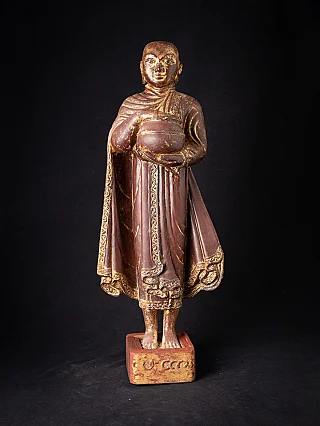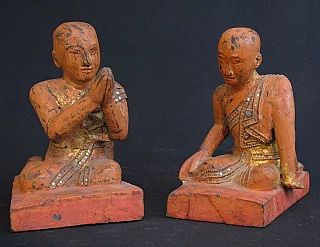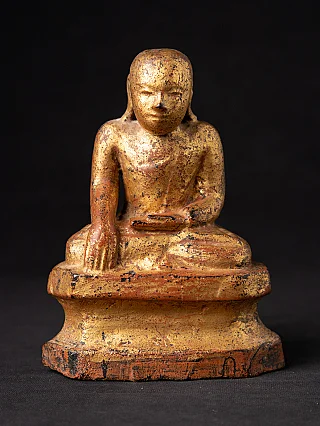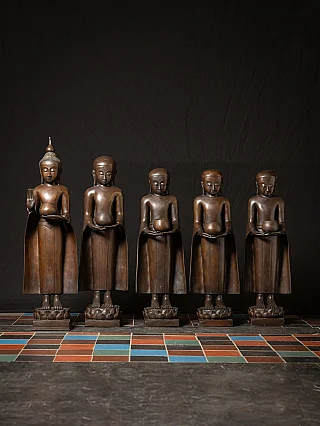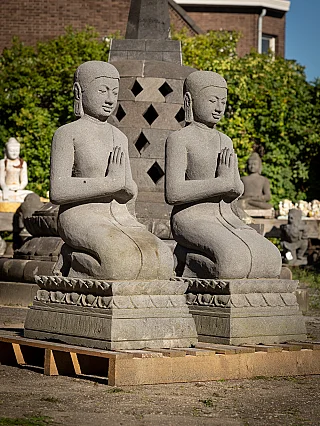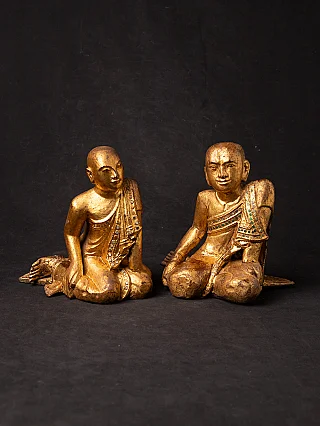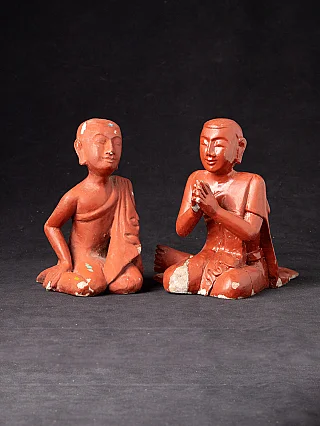Moggallana – Closest Disciples of Lord Buddha
Author : Peter Vredeveld

Moggallana is another chief disciples of Lord Buddha along with Sariputra and was considered most capable after Sariputra.
Moggallana, also known as Mahamaudgalyayana or Maudgalyayana, is a pivotal Buddhist disciple within the Theravada tradition. Renowned among peers like Sariputra, Subhuti, and Mahakasyapa, Moggallana was esteemed as the second most capable and trusted disciple of Shakyamuni Buddha. Serving alongside Sariputra as a chief assistant, with Ananda acting as Buddha's attendant, Moggallana was renowned for his supernatural abilities like mind reading and magical powers, which he utilized to enhance his students' understanding of the Wheel of Dharma.
Moggallana's Early Life and Quest for Enlightenment

Born into a Brahmanic family in the kingdom of Magadha, Moggallana was a descendant of Mudgala. Raised by a prominent father in their town, he experienced a life of wealth and honor. Forming an inseparable bond with Sariputra in childhood, the two shared profound existential questions about life, death, and impermanence. These questions drove them to seek enlightenment through asceticism, wandering across India. This journey eventually brought them to the religious leader Sanjaya Belatthiputta, under whose guidance they sought wisdom.
Their search for enlightenment was a personal quest that reflected their time's more significant spiritual and philosophical pursuits. In ancient India, many thinkers and seekers explored the nature of existence, and Moggallana and Sariputra were part of this vibrant spiritual landscape. Their meeting with Sanjaya Belatthiputta was a significant step in their journey, exposing them to philosophical thoughts and practices.
The Transformation as Buddha's Disciples

Disillusioned with Sanjaya's teachings, Moggallana and Sariputra embarked on a quest for the road to the Deathless. This spiritual journey exposed them to various ascetics and Brahmans, yet none could quench their thirst for spiritual knowledge. The turning point came when Sariputra encountered the teachings of Lord Buddha. Captivated by this newfound wisdom, they both sought direct guidance from Buddha. Despite Sanjaya's offer to make them co-teachers, they chose the path of Buddha, taking with them 250 of Sanjaya's disciples. Buddha recognized their potential to become his most capable disciples upon their arrival. Following their ordination, Buddha imparted the Wheel of Life and Dharma teachings, setting them on their paths to enlightenment.
Their acceptance of Buddha's teachings and ordination marked a significant moment in the history of Buddhism. Moggallana and Sariputra, with their profound understanding and commitment, were not only students but also essential contributors to the spread of Buddha's teachings. They played a crucial role in establishing the early Buddhist community and were instrumental in articulating and disseminating the Dharma.
Moggallana's Teachings and Miracles

Moggallana, known for his profound wisdom and psychic abilities, was not only a chief disciple of Buddha but also a significant teacher in his own right. His ability to perform miracles and his deep understanding of the Dharma allowed him to communicate complex Buddhist concepts effectively. He often demonstrated supernatural feats like telekinesis and recollection of past lives to illustrate the principles of karma and rebirth. Moggallana's teachings, characterized by a blend of insightful spiritual guidance and miraculous demonstrations, played a crucial role in spreading and deepening the understanding of Buddhism among his followers.
One of Moggallana's most famous stories involves his descent into the realms of hell, where he witnessed the suffering of beings and understood the profound consequences of negative actions. This experience was transformative for Moggallana and became a crucial teaching in Buddhist philosophy about the nature of suffering and the importance of ethical conduct.
Comparison with Other Disciples
While Moggallana is often mentioned alongside Sariputra, his teachings and contributions had distinct characteristics. Sariputra, known for his wisdom, focused on the analytical aspects of the Dharma, whereas Moggallana's approach was more experiential, demonstrating the teachings through his psychic abilities. This complementarity between Moggallana and Sariputra provided a holistic understanding of the Buddha's teachings, catering to many followers with different spiritual inclinations.
Moggallana's role was not just limited to being a disciple; he was also a teacher and a guide. His interactions with other figures in the Buddhist texts, such as his dialogues with the Buddha and his teachings to other monks and lay followers, highlight his significant role in shaping the early Buddhist community.
Moggallana's Influence on Buddhist Tradition
Moggallana's legacy extends far beyond the immediate circle of Buddha's disciples. He is revered in various Buddhist traditions for his compassionate approach and commitment to alleviating suffering. His life, teachings, and miraculous abilities inspire Buddhist practitioners worldwide. He embodies the ideals of spiritual attainment, ethical conduct, and the pursuit of wisdom. The story of Moggallana, particularly his tragic demise, is a powerful illustration of the inexorable law of karma, reminding practitioners of the consequences of one's actions, irrespective of their spiritual status.
Moggallana is remembered and revered across different schools of Buddhism. In Mahayana traditions, he is often depicted in art and literature, symbolizing the power of spiritual transformation. In Theravada Buddhism, his story is a source of teachings on the impermanence of life and the importance of diligence in spiritual practice.
Moggallana's Role in Spreading Buddhism
Moggallana's contributions were pivotal in the early spread of Buddhism. His teachings, often filled with vivid illustrations of Buddhist concepts, made the Dharma accessible to a broader audience. His interactions with various communities and his ability to bridge the gap between complex philosophical ideas and practical spiritual practice significantly established Buddhism as a central religious and philosophical system in ancient India and beyond.
His death, caused by a brutal attack by bandits while meditating in a forest, is attributed to the negative karma of a past life misdeed, according to Buddhist tradition. This incident underscores the central Buddhist tenet that karma affects everyone, regardless of their spiritual accomplishments, and serves as a sad reminder of the profound impact of karma in Buddhist teachings.
Conclusion
Moggallana's life and teachings remain a beacon of inspiration within the Buddhist tradition. His journey from a seeker of truth to becoming one of Buddha's most revered disciples exemplifies the transformative power of the Dharma. His profound wisdom, psychic abilities, and compassionate approach to teaching continue to resonate with Buddhist practitioners, symbolizing the path to enlightenment and the importance of ethical conduct and spiritual development.
Share this page

















